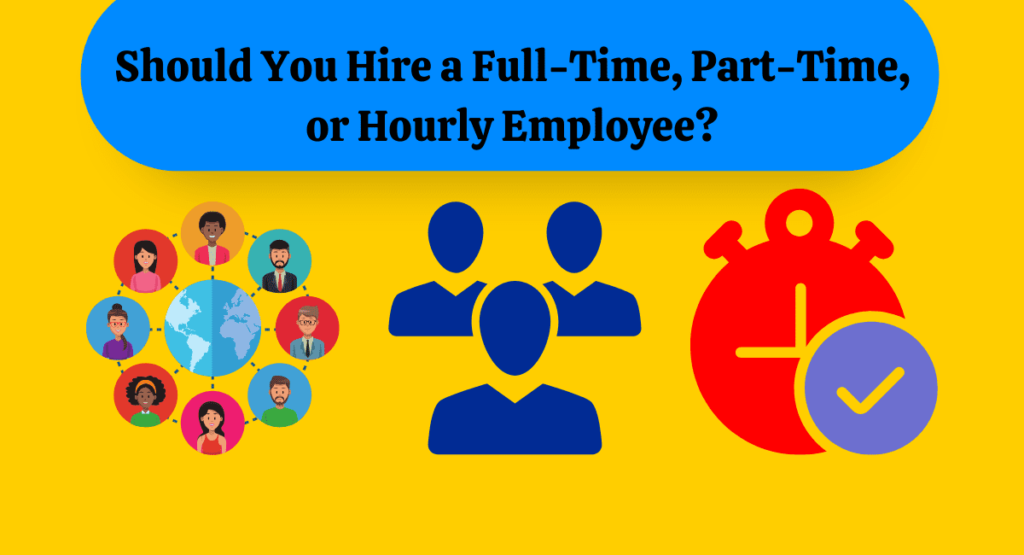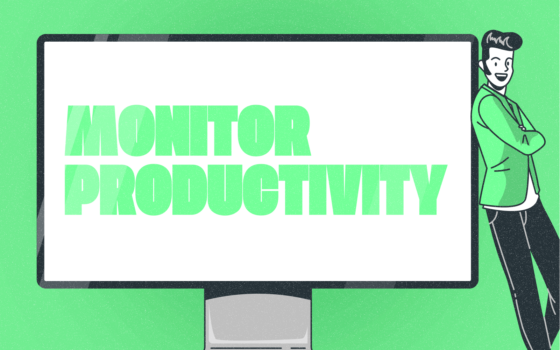Part Time, Full Time or Hourly – How to Decide When Hiring


Deciding to hire a new employee can take time and effort. Do you want to hire full-time, part-time, or hourly?
Each option has pros and cons; deciding which is the best fit for your company is challenging.
Companies will consider the benefits and drawbacks of full-time, part-time, and hourly employees to decide what is right for the business.
So read on!
What factors go into deciding whether to hire full-time or part-time employees
“Part-time employees typically include students, moms and dads, retirees, and other workers who don’t want or need the time commitment of a full-time position.” The Balance Money.
Employers hire full-time employees to constantly present in the office and complete long-term projects. Full-time employees are also more loyal to the company and less likely to quit.
On the other hand, part-time employees often offer more flexibility and cost less in wages. Employers may hire part-time employees if they don’t need full-time employment or if their budgets are tight.
They may also choose to supplement full-time workers with part-timers for specific projects or to handle periods of
Factors that companies consider when they decide to hire full-time employees are the employee’s skills, experience, and availability.
Employee’s skills
The company sees the employee’s skills as a significant factor in hiring full-time. They are looking for individuals with the necessary skills to do the job and can be productive from the start.
Additionally, they want employees willing to put in the full-time effort and are committed to the company’s goals. If the employee can demonstrate that they have the skills and are eager to work hard, then the company is more likely to hire them full-time.
Employee experience
Employee experience is important to companies because it can help them decide whether or not to hire full-time employees.
A company can hire a more stable and reliable workforce by hiring full-time employees. However, full-time employees may be more expensive than part-time employees, so a company must weigh the pros and cons of hiring full-time employees.
Ultimately, employee experience is one factor that a company may consider when deciding to hire full-time or part-time employees.
Availability
A company may consider employee availability as a factor in hiring full-time employees because full-time employees are available for work during regular business hours. Part-time employees may only be available to work a certain number of weekly hours.
Hiring full-time employees can ensure that a company has a full-time workforce available during regular business hours. If a company needs coverage outside of regular business hours, it may need to hire additional part-time or hourly employees.
Common reasons to hire a part-time employee

There are a few common reasons to hire a part-time employee.
One reason is that full-time employees might be overworked and need some help. Part-time employees can take on some workloads, freeing full-time employees to focus on their other duties.
Another reason to hire part-time employees is that it can be more cost-effective. It can be more expensive to have full-time employees on staff, so hiring part-timers can help save on costs.
Finally, sometimes companies hire part-timers to test whether the position would fit a full-time employee well. If the part-time employee does well, and the company decides to make the position full-time, they already have someone familiar with the job and the company culture.
Common reasons to hire an hourly employee
There are many reasons to hire an hourly employee, but some of the most common reasons are because:
- They can work flexible hours.
- They work on short-term projects.
- They work for on-call work.
Pros and cons of hiring full-time employees

One of the most critical decisions a business can make is whether to hire full-time or part-time employees.
Both choices have pros and cons, and the decision ultimately depends on the needs of the business.
Full-time employees are those who work hours per week. They are typically eligible for full-time employees’ benefits like health insurance and paid vacation days. They also tend to be more invested in the company, which can lead to higher productivity levels. However, full-time employees are also more expensive to maintain, and they may require more hours of supervision.
Part-time employees, on the other hand, work fewer hours per week. They are usually not eligible for benefits but require less training and supervision. In addition, they may be more flexible regarding their hours and availability.
The decision of whether to hire full-time or part-time employees is a complex one, and there is no right or wrong answer. Ultimately, it depends on the needs of the business and the type of work.
Pros and cons of hiring part-time workers
There are several pros and cons to hiring part-time workers. On the plus side, paid time off is often more generous for part-timers than full-timers.
Part-time employees can be an excellent benefit for employees with family obligations or other commitments outside of work. Part-time workers also tend to be more flexible and adaptable than full-time employees.
Part-time employment can be a valuable asset in constantly changing or evolving environments. On the downside, part-time employees may have a different commitment to their job than full-time workers.
They may also be less likely to receive opportunities for advancement or training. In addition, part-time workers may have less job security than their full-time counterparts.
How to decide the best option (Full-time, Part-time or Hourly) for your business?

Full-time, part-time or hourly? Here are tips to help you make the decision:
Consider the business needs.
Is full-time more conducive to your workload? Or would part-time or hourly staff be better suited for specific tasks and times of the year?
Assess the cost benefits.
Depending on the hours, full-time staff may require more of an upfront investment in salary, while part-time or hourly staff might be a better option if you’re looking to cut costs.
Factor in the skillset that’s required.
Do you need full-time expertise from someone, or do certain tasks only require short-term or one-off help? That could sway your decision between full-time and other options.
Ultimately, it comes down to what works for your business and meets its needs. Whether full-time, part-time or hourly, assessing these factors should help you decide which is best for your organization.
Tips for finding suitable candidates for full or part-time positions
There are several things to remember when looking for the right candidates for full or part-time positions.
First, consider the hours you need covering and whether candidates would better suit full or part-time employees for the job. Full-time employees typically work between 35 and 40 hours per week, while part-time employees usually work fewer than 34 hours per week.
Remember that you may need to offer benefits to full-time employees, such as health insurance and paid vacation days.
Next, think about the skills and qualifications you need for the position.
For example, if you’re looking for a customer service representative, you’ll want someone with excellent communication skills and the ability to handle difficult situations.
After you have the qualifications you’re looking for, write a detailed job description, so potential candidates will know exactly what you’re looking for.
Finally, reach out to your network of friends, family, and colleagues to see if they know anyone who could be a good fit for the position.
You can also post the job on online job boards or use a staffing agency to help you find qualified candidates.
Interview tips for determining if a candidate is a good or not good fit for your company

The crucial factor for the company is whether the candidate is a good choice for your company.
With the fair labour standards act in mind, it’s essential to make sure that you ask the right questions during the interview to determine if the candidate meets your company’s needs.
Tips to make the best decision for your companies:
- Assess the candidate’s qualifications and experience. Ensure they have the skills and knowledge necessary to do the job.
- Evaluate their ability to work within your company’s culture. Do they seem like someone who will be a good fit with your team?
- Consider their long-term goals. Are they looking for a position that will allow them to grow with your company?
By asking these critical questions, you can ensure that you find a high-skills candidate for the job.
How to make the final decision about whom to hire?
You have some key questions before deciding.
What is your budget? Your budget will generally dictate whether you hire full-time or part-time employees. Part-time employees cost less, but companies may need full-time employees for specific roles.
Do you have enough work? Do you have enough work to keep them busy daily if it’s a full-time role?
Do they have the qualifications and experience necessary for the job? Make sure that whomever the company hires, They have the suitable skill set and experience level to perform the tasks required by the job.
Tips for making the most of part-time workers.
Part-time workers can be significant assets to a business but may require extra guidance.
First, create clear expectations for the role that part-time employees need to meet. Make sure you communicate these expectations clearly and often.
Next, provide part-timers with the necessary training and resources to succeed in their roles. Lastly, please show your appreciation for their hard work by rewarding them with bonuses or other forms of recognition when appropriate.
By taking these steps, you can ensure that your part-time workers are as successful as possible. It’s crucial to assess full-time or part-time and decide.
FAQ
How can you increase your chances of getting hired as a self-employed or freelancer?
First, ensure your portfolio is up to date and showcases your best work.
Next, network with other professionals in your field, and attend industry events where you can meet potential clients.
Finally, be proactive in your job search, and reach out to potential employers directly.
Is working full-time worth it?
Working full-time may be worth it for some people, but not everyone. It depends on what you want to get out of your job.
Some people may prefer to work part-time to have more time for other activities, while others may only be able to find full-time work.
Consider whether or not the job offers benefits like paid vacation days or health insurance. It’s up to you to decide if full-time or part-time is the best fit for your business needs.
Ultimately, hiring full-time or part-time employees is an important decision that requires thoughtful consideration. By assessing a candidate’s qualifications and experience, evaluating their ability to work in your company’s culture, and considering their long-term goals, you can ensure that you hire a suitable person for the job.
Furthermore, it’s essential to consider factors such as budget and workload when deciding who to hire, full-time vs. part-time.
What are the disadvantages of working full-time?
One of the biggest disadvantages of working full-time is its impact on your personal life. When you work long hours, it can be challenging to find time for friends and family.
You may miss important events with families, like birthdays and anniversaries. Additionally, working full-time can be especially tough if you have young children at home. You may only be able to spend quality time with them if you’d like.
Another disadvantage of working full-time is that it can be pretty stressful. Juggling a job and other responsibilities can be overwhelming, and it’s easy to feel like you’re never really off the clock.
The condition can lead to burnout, affecting your physical and mental health. Additionally, you may be at greater risk for your health if you work in a high-pressure job.
Finally, working full-time can be a financial risk if you’re self-employed or a business owner. If the business is slow or you have a few bad months, you may not be able to make ends meet. Full-time jobs can put much stress on you and your family.
Conclusion
Now that you understand the importance of full-time, part-time, and hourly employees, it’s time to decide which type of employee is best for your business.
Full-time employees are a good option if you need someone available during regular business hours and can work long-term.
Part-time employees may be better if you only need help for a limited number of hours each week or if you want to save money by not paying benefits.
Hourly employees are ideal if you need workers who can do the job on an as-needed basis or if you want to avoid hiring a full- or part-timer.
No matter what type of employee you choose, ensure you, screen candidates thoroughly and conduct background checks before making any final decisions.


